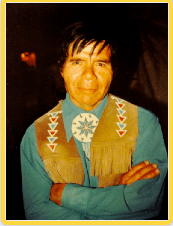Waáno-Gano
| Waáno-Gano | |
|---|---|
 Joseph "Waáno-Gano" Noonan | |
| Born |
Joseph Noonan March 3, 1906 Salt Lake City, Utah, United States |
| Died |
September 1, 1982 Los Angeles, California |
| Nationality | American |
| Known for | Painting, landscape painting, murals. |
| Website | https://picasaweb.google.com/carl.calkins/JoeWaanoGano |
Joseph Theodore "Waáno-Gano" ("Joe") Noonan of the San Fernando Valley Professional Artists' Guild[1][2][3] was an artist born on March 3, 1906 in Salt Lake City, Utah.[4] He self-identified as being of Cherokee descent.
Background
Joseph Noonan's parents were Irene May Noonan (1876–1960), whom the artist called Rena May Lash-Heart,[5] and James A. Noonan. The couple married in 1891 and four children, three of whom survived past infancy. James died around 1900. Irene was born in Arkansas in May 1876 and died in California in 1960.[6]
Family
He married Christine "Nunny"[7] Ruben, a member of the Karuk tribe, on 15 March 1935.[6] One of Waáno-Gano's nephews was television producer Buddy Noonan.
Education
After studying at the Los Angeles Academy of Fine Arts and the Christian von Schneidau Art School in the 1920s, Waáno-Gano eventually settled in Los Angeles as a landscape painter in pastel and oil.[8][9]
Name
The Amerindian name Waáno-Gano comes from waáno meaning "bow" and gano meaning "arrow" in the Iroquois language, Seneca dialect.[10]
Art
He specialized in native American scenes and California landscapes.[11] His work has been in the collections of Sherman Indian Museum Western Airlines offices, and Gardena High School. He exhibited throughout the 1930s and 1940s at the California Art Club,[12] San Fernando Valley Art Club, Los Angeles Museum of Art, Los Angeles City Hall, and in Chicago. He also lectured on Indian life, designed Indian motifs for textiles,[13] and painted murals in Rapid City, South Dakota, and San Francisco, California.
The designer of the Indian Achievement Medal, Waáno-Gano served[6] during World War II in the US Air Force. He held more than 118 one-man shows and painted 27 murals, including a 6 x 16 foot mural for New Western Air Lines, which was presented on September 1, 1944 at 287 Geary Street, San Francisco, California,[14][15] depicting native American Indian life and holding art exhibitions.[16] Waáno-Gano created the design for the Will Rogers Memorial and designed murals for both the Los Angeles Library before it was burned by arson and for Los Angeles County General.
Waáno-Gano lectured on native Indian life and wrote on the art of the American Indian. Along with his wife, Waáno-Gano was highly involved in the Bureau of Indian Affairs. Both were also active in the Native American art community and participated in ceremonial dances.[17][18] A few of Waáno-Gano's honors included the Baltimore Annual, Hermosa Beach, CA Best Picture to Live With Award (1952), CCP Hall of Fame, (Indian Section), California International Flower Show Art Exhibition (Chairman 1958), and Honor Roll of the Greatest Living Indians (1933).[19][20]
Death
Waáno-Gano was a resident of Los Angeles until his death on September 1, 1982[21] in Los Angeles, California.[22]
Notes
- ↑ "Waáno-Gano testifying before the Building and Safety Committee on suspected Communist infiltration of the Municipal Arts Department". Herald Examiner Collection. Los Angeles Library, Los Angeles, black and white photograph, 1951. October 2013.
- ↑ Joe T. Waáno-Gano Noonan cited in the Catalog of Copyright Entries, art 4. Works of Art, Etc. New Series by Library of Congress. Copyright Office.
- ↑ Who's Who in California 1942-1943.
- ↑ Tracy. "Joe Waano-Gano (1906–1982)." Early California Antiques. Retrieved 15 Oct 2013.
- ↑ Portrait of Waáno-Gano's mother Rena Lash Heart as drawn by the artist
- 1 2 3 Snodgrass, Jeanne O. "American Indian Painters: A Biographical Directory." New York: Museum of the American Indian, Heye Foundation, 1968. Retrieved 15 Oct 2013.
- ↑ Portrait of Waáno-Gano's wife Nunny Noonan as painted by the artist
- ↑ Academic drawing, "Female Nude with Ball" by Waáno-Gano.
- ↑ Academic drawing, "Seated Male Nude" by Waano-Gano.
- ↑ Sydney Henry Gould and David B. Kronenfeld. "The Classificatory System of Kinship." A new system for the formal analysis of kinship. 30 May 2000. Retrieved 4 July 2014.
- ↑ Treadway Gallery
- ↑ [California Art Club: Chronology 1909-2013 http://www.californiaartclub.org/chronology-of-the-cac/]
- ↑ [Catalog of Copyright Entries, 1935, Engravings, Prints, Etc., p. 535, Waano-Gano: Indian decorative design, G 18928, Dec. 12, 1934. Retrieved 18 November 2014.
- ↑ Bay Region Business, San Francisco Chamber of Commerce, Call Number 1586512, San Francisco Public Library, Americana Collection, Volume 1, 1944. Retrieved 18 November 2013.
- ↑ My Desert Magazine. 1997
- ↑ California Art Club: The CAC Bulletins (1950-1959), Summer 1959; Vol. 18 No. 8; Solo Show, September 1954; Vol. 14 No. 1; One-Man Show, April 1954; Vol. 13 No. 8; Joe Waano-Gano talks on "The Art of the American Indian," November 1950; Vol. 9 No. 3.
- ↑ California Art Club 58th Annual Gold Medal Juried Exhibition: "Midsummer Night Council," "Katchina Doll," "Noble of the Plains," "Bashful Brave," "Summer Afternoon," "Nocturnal Soliloquy," by Joe Waáno-Gano.
- ↑ California Art Club: The CAC Bulletin, May 1944; Vol. 2 No. 11, featuring Waáno-Gano (Joe T. Noonan) and his wife Christine Noonan
- ↑ Gateway Galleries
- ↑ Worthpoint Worthopedia: Joe Waano-Gano (1906-1982), 04/03/2011
- ↑ Waáno-Gano's s a member of the California Art Club won first prize at the LA County Fair in 1927
- ↑ Joe Waáno-Gano the Cherokee Indian painter